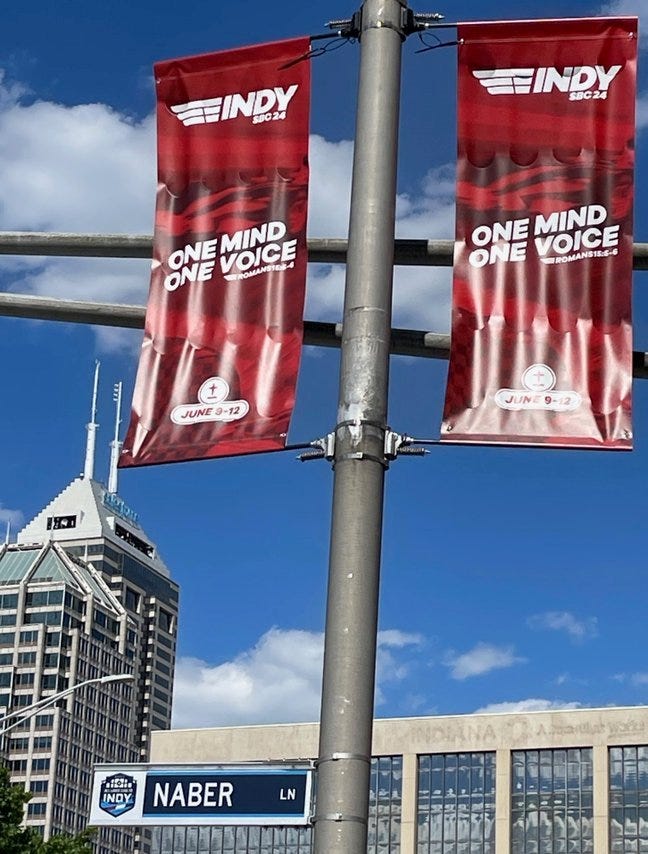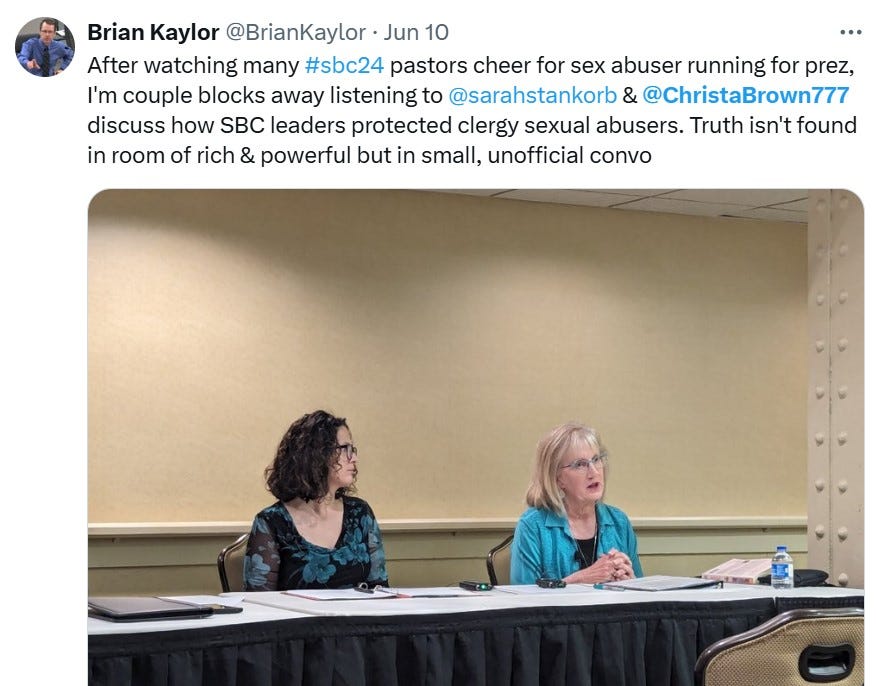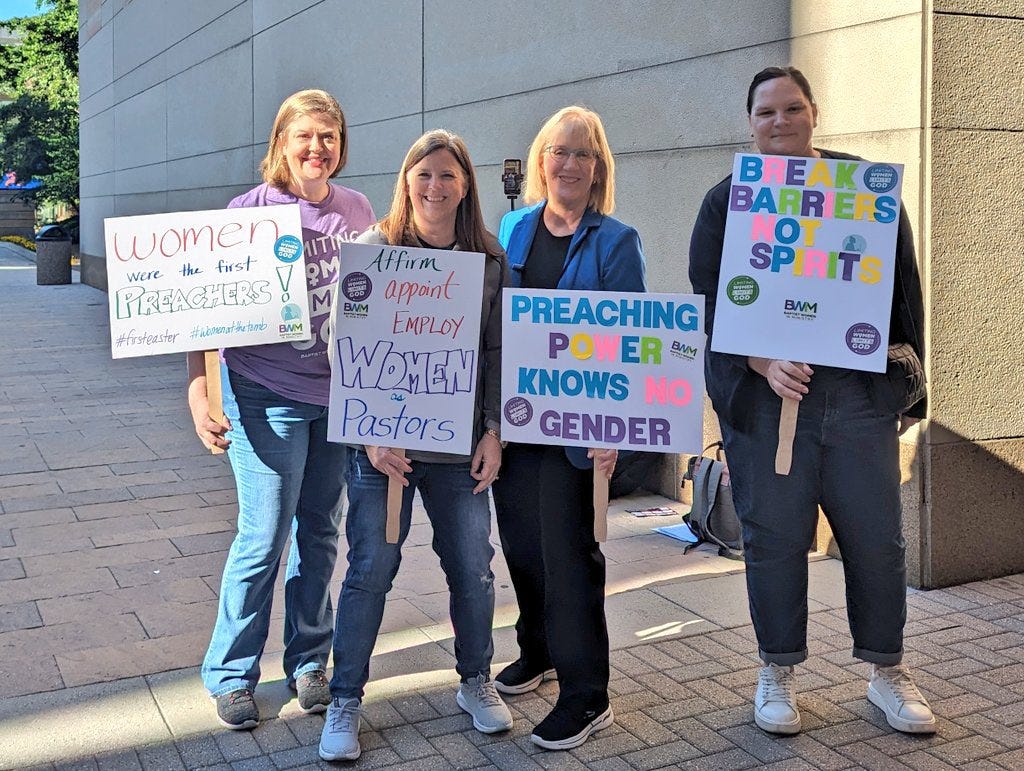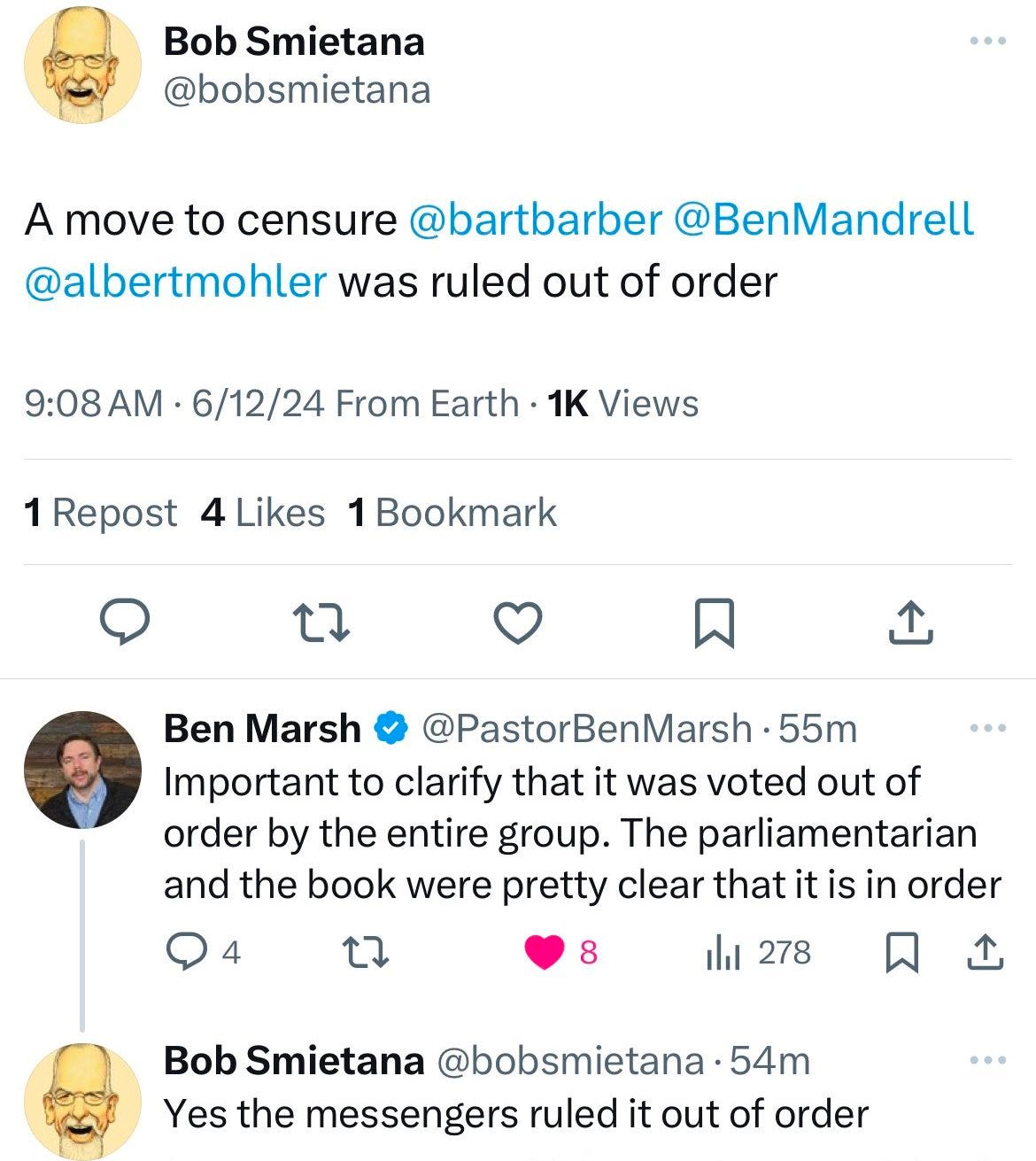The Good, the Bad, and the Ugly
Snippets from my time in Indianapolis during the SBC's annual meeting
Everywhere I went, I felt the unsettling vibe of unbalanced testosterone. With nearly 11,000 Southern Baptist delegates (“messengers”) bustling around the Indianapolis convention center, and with the vast majority of them male, the sidewalks, hotel lobbies, and cafes were filled with packs of men calling each other “Brother.”
If you didn’t grow up in a Baptist church, this likely won’t make sense to you. But in Baptistland, every male is a “Brother.” And it’s as though they all have bad memories and might forget they’re “Brothers” if they didn’t keep reminding each other. So, they toss in a “Brother” about every tenth word—or so it seems.
Once, when I’d been waiting for an elevator, just as the doors opened, a pack of “Brothers” came along. I backed away and let them have it to themselves. I just couldn’t bear to hear another “Brother.”
At times, it all had the feel of a frat house but with red lanyards instead of red Solo cups.
Scattered around town were Southern Baptist Convention banners saying “One Mind One Voice,” and I couldn’t help but think about the hive-mind of the Borg collective. (In fairness, maybe I watched a bit too much Star Trek back in the day.)
But despite all that, I was glad to be there.
Indianapolis holds special weight in the long saga of the Southern Baptist Convention’s recalcitrant history of refusing to protect kids and congregants against clergy predators. In 2008 when the SBC last met in Indy, it could have—and should have—begun keeping a database of credibly accused clergy sex abusers then and there. It had been on the agenda.
But they chose to do nothing.
Since then, in the intervening sixteen years, countless more kids and congregants have had their lives decimated by clergy sex abuse and religious institutional betrayal. This is the human cost of the SBC’s long recalcitrance.
So, when Sarah Stankorb proposed doing a joint book event during the time of the SBC’s annual meeting, it felt like an opportunity to speak truth about that human cost. And on a personal level, I felt it as an act of holy defiance. Despite all the awfulness the SBC has dished out—over the course of decades—I’m still here. Still standing. Still talking.
The Good
At the book event, just a couple blocks away from SBC annual meeting, it was an honor to sit side-by-side with Sarah and discuss our books, Disobedient Women and Baptistland. The mood was warm and the reception was welcoming. It carried the feeling of “beloved community,” and it was a treat to meet some people in person whom I’d previously encountered only online. Afterwards, a few shared with me painful stories of their own abuse. Brian Kaylor summed up the event in a way that resonated: “Truth isn’t found in room of rich and powerful but in small, unofficial convo.”
A pastor (alone and not in a pack) stopped me on the sidewalk. “Are you Christa Brown?” he asked. I hesitated a split-second but acknowledged I was, and he proceeded to tell me that he was in the middle of listening to my book, Baptistland, on audio and how much it meant to him. He also said that his church had a woman staff pastor and that they would likely be leaving the SBC soon.
I met Meredith Stone and others from Baptist Women in Ministry, and stood in solidarity with them on a street corner as people walked by to enter the convention. Using prayer as a form of resistance, they took turns reading hundreds of prayers aloud for a Facebook Live event—messages of support for women pastors sent in from around the world—and it was an honor to help read those prayers, even as just steps away, a man was handing out flyers urging people to support a ban on women pastors.
In advance of the convention, I had repeatedly urged that some SBC messenger should put forward a resolution or a motion to censure SBC president Bart Barber for having authorized that anti-survivor amicus brief. But I had predicted not a single person would. I was wrong. A North Carolina pastor named Louis Cook got to a microphone and put a motion onto the floor of the convention. Someone seconded it. As Mark Wingfield told it, “even getting such a motion to the floor was unprecedented.”
Just blocks from the convention center, the White River runs through Indianapolis. It was beautiful and brought respite.
The Bad
The “Law Amendment” was put before the convention as an effort to enshrine in the SBC’s constitution a ban against women pastors of “any kind.” It failed, getting 61.45% of the vote instead of the needed two-thirds. Meredith Stone, executive director of Baptist Women in Ministry, explained the bittersweet victory this way: “Even though the amendment failed, women who serve as pastors in Southern Baptist churches will continue to be diminished, demeaned and denigrated. Southern Baptists will continue to silence women.”
The SBC disfellowshipped First Baptist Church of Alexandria, a historic Virginia congregation, because of its belief that women can serve in any pastoral role. In practice, the church currently has a man as senior pastor and a woman as children’s pastor, but after the pastor of a neighboring church ratted out the Alexandria church, the SBC’s credentials committee made inquiry and concluded that the church’s “egalitarian beliefs” warranted expulsion. 91.78% voted in favor.
The Ugly
The SBC made no meaningful progress on abuse reform. The purported database holds not a single name of any credibly accused clergy sex abuser; there is no permanent funding for abuse reforms; and not a one of these twelve things were done. After two full years, and after a prior task force before that, the Abuse Reform Implementation Task Force implemented almost nothing. As Mark Wingfield said, the task forces “have been almost non-events.” But what made this 2024 display particularly painful were all the excuses and blame-shifting: it was an “impossible task” … others didn’t release the funding … we didn’t have the resources … insurance concerns … blahblahblah. What I can’t understand is that all of this was obvious from the get-go.
The volunteer task force was set up to fail; it never had the resources to do the job; the priority has always been protecting the SBC against liability risks. So why didn’t task force members realize all this sooner instead of playing along for two years with the institutionally self-serving narrative of “progress”? Rather than trailing survivors along, it would have been far kinder if they had all resigned in protest and told why.
The motion to censure SBC president Bart Barber was shut down and ruled out of order. The motion had also urged censure of Ben Mandrell and Al Mohler for their authorization of the brief on behalf of Lifeway and Southern Baptist Theological Seminary, and they were both allowed time to speak against the motion. But the proponent of the motion, Pastor Louis Cook, was not allowed any time at all to speak in support of his motion. Instead, the whole of the SBC messenger body shut it down and declared the motion out of order… in contrast to the ruling of the parliamentarian himself. “Ugly” isn’t adequate to convey what happened here. Bart Barber also got a standing ovation.
Southern Baptists voted to condemn the use of in vitro fertilization procedures, declaring them “dehumanizing” and urging that the government should restrain IVF procedures as being “inconsistent with the dignity of human beings, including frozen embryos.” The resolution was put forward by Southern Baptist seminary president Al Mohler, who has also voiced his support for wanting women who have abortions to be criminally prosecuted. Coming from the largest Protestant faith group in the country, this resolution helps shift the fringe to the forefront and signals a further move to the hard right in efforts to restrict reproductive healthcare based on religious beliefs.
What should have been a simple 2 ½ hour flight home turned into an all-day flight from hell. Strangely, it seemed almost appropriate given where I was coming from—the Southern Baptist Convention annual meeting. There was turbulence and windshear, which put us in a seemingly endless holding pattern—we couldn’t land. We were re-routed to another city to refuel, and there, we endured purgatory on the tarmac. An unruly passenger got escorted off the plane by armed officers, and many applauded. Finally, the plane took off to return to Denver where we had yet another failed attempt at landing (literally going down only to make a quick turn back up), and finally, the plane did a big loop-around and made a successful landing. Hallelujah! All the passengers applauded, and I felt the commonality of our human bonds—and gratitude for the pilot. I’m glad to be home.
My new book, Baptistland, is now available!











Appreciate these reflections! "One Mind One Voice" is such a creepy slogan...